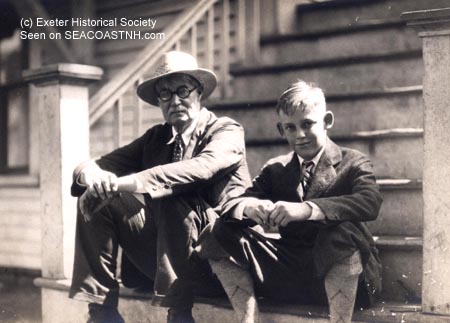|
FRESH STUFF DAILY |
|
|
||
|
|
||
|
|
||
|
SEE ALL SIGNED BOOKS by J. Dennis Robinson click here |
||
Page 3 of 3
Most of Henry Shute’s writing revolved around his bad boys, culminating in his final book Plupy, the Wirst Yet in 1929. An armchair therapist might point out that Shute borrowed many of his bullying tales from his father’s boyhood, and often teased his own son for being too proper and mannered. His work never strayed from Exeter (sometimes called Elmtown), yet Shute did flirt with other topics. In 1907 he published A Profane and Somewhat Unreliable History of Exeter. An avid gardener, he chronicled his agricultural efforts in two minor classics entitled Farming It (1909) and The Real Diary of the Worst Farmer (1920). Among the best known passages from this "minor classic" farmer Shute made this entry in his dairy diary: "June 3, 1910: Bought an air rifle known as a thousand-shot rifle. Not having a dog, I tried it on the cow at fifty yards." Shute also wrote briefly about his legal life in The Country Lawyer (1911). With income from his books, attorney Shute was reportedly lenient when it came to billing his customers. In his early years as an attorney he once wrote: "I have a good deal of not particularly remunerative practice, my clients consisting largely of three classes: those who wish to pay but cannot, those who can but won’t, and those who cannot and wouldn’t if they could." Like Twain and Aldrich, the lean, six-foot man retained a boyish appearance throughout his elder years. Never fond of school, church or authority in general, Shute reportedly "swore like a pirate," except in the presence of women. Even as the city judge, he retained a lifelong love of childish pranks or practical jokes, many of them harsh and verging on sadistic by today’s standards. And it is in that very dichotomy that Shute best defines his birthplace. Exeter at the turn of the century was an oasis of education at Phillips Exeter Academy surrounded by a tough little New England village of farmers and factory workers scraping out a living. As lawbreaker and lawyer, both judge and juvenile delinquent, he walked comfortably and humorously in both worlds. For a man who came late to literature, the "Mark Twain of Exeter" left many books and more friends. At his death in 1943, during the heart of World War II, the town of Exeter, New Hampshire closed down so the townsfolk could attend his funeral. One Boston newspaper obituary predicted that Plupy Shute "will go on living in American hearts, eternally, like Huck Finn and Tom Sawyer." Eternal in Exeter, perhaps, which was always fame enough for Henry Shute. Sources: Plupy Shute’s Exeter by Olive Tardinff (1988), "Alias ‘Plupy’ Shute" by Philbrook Paine in NH Profiles (1960), The Dictionary of Literary Biography (Vol. 9), and "The Works of Plupy Shute" by Henry Shute, The Saturday Evening Post (February 4, 1905). Copyright © 2007 by J. Dennis Robinson. All rights reserved. Robinson is editor and owner of the popular web portal SeacoastNH.com and author of two juvenile biographies and a number of books on local history.
Please visit these SeacoastNH.com ad partners.
News about Portsmouth from Fosters.com |
| Wednesday, April 24, 2024 |


|
Copyright ® 1996-2020 SeacoastNH.com. All rights reserved. Privacy Statement
Site maintained by ad-cetera graphics

 Link Free or Die
Link Free or Die



















